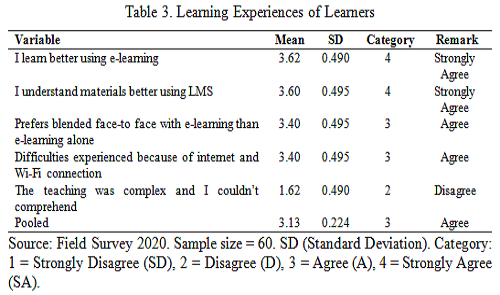
Handling Disrupted Learning During COVID-19 Pandemic: Learners’ Experience in Nigeria
Abstract
Corona virus has affected not only human health but also educational sector. Schools were forced to suspend face-to-face learning while online learning was introduced. How could learning be undisrupted during the lockdown period is the thrust of this paper. The paper examined the effectiveness of podcast (video recorded) lesson as a strategy in online teaching and to what extent the strategy met the needs of the learners during the challenging period of pandemic COVID-19. The study adopted mixed method research which consisted of the three main phases of design. Questionnaire which comprises of 19 items and divided into two sections was used for data collection while fifty (50) participants participated in the study. It was discovered that learners displayed positive perceptions towards the use of video recording lessons during pandemic period. Learners reported that online learning should be used to compliment face-to-face teaching even after the pandemic period.
Keywords
Full Text:
PDFReferences
Aixia, D. and Wang, D. (2011). Factors influencing learners’ attitudes towards e-learning and development of e-learning environment based on the integrated e-learning platform. International Journal of e-learning, e-Business, e-Management, and e-Learning, 1(3), 264-268.
Beamish, P. and Brown, J. (2019) Podcasting in the classroom: A case Study. Retrieved from citeseerx.ist.psu.edu/viewdoc/
Bhattacharjee, J. (2015). Constructivist approach to learning: an effective approach to teaching learning. International Research Journal of Interdisciplinary and Multidisciplinary Studies, 1(6),65-74. ISSN 2394-7969.
Buzzetto-More, N.A. (2008). Students perceptions of various e-learning components.
Conole, G. (2013). Designing for learning in an open world. New York: Springer. Doi:10.1007/978-1-4419-8517-0.
Francom, J., Thomas, G. R., and Mumbi, K. (2011). The effects of podcasting on college students and attitude. Journal of the Research Centre for Educational Technology 7(2).
Hussairi, I. (2007). A study of students’ attitude towards virtual education in Pakistan. Turkish Journal of Distance Learning, 8(2), 69-79. http://tojde.anadolu.edu.tr/tojde 26/pdf/article_6pdf.
Saba, F., (2005). Critical issues in distance education: A report from the United State. Distance Education, 26(2): 255-272. Doi:10. 1080/01587910500168892.
Saba, F. (2012). A systems approach to the future of distance education in colleges and universities: Research, Development and implementation. Continuing Higher Education Review, 76: 30-37.
Saba, F. and Shearer, R.L. (2018). Transactional distance and adaptive learning. Planning for the future of higher education. Routledge, Taylor and Francis Group. Doi: 10.1080/08923647.2018.1477534.
Scutter, S., Leva, S., Tim, Sand., and Sharron, K. (2010). How do students use podcasts to support learning? Australasian Journal of Educational Technology, 26(2): 180-191. Doi:10.1016/j.compgeo.2011.07.004.
Sharma, S. (2006). Constructivist approaches to teaching and learning. NCERT: NewDelhi.
Spies, M. (2011). Engaging the online learning: Student reactions to the use of audio podcast in off campus courses. In G. Williams, P. Statham, N. Brown &B. Cleland (Eds.), Changing Demands, Changing Directions. Proceedings Ascilite Hobart 2011. (1167-1177). http://www.ascilite. org.au/conferences/hobart11/procs/Spies-full.pdf.
Rowe, K. (2006). Effective teaching practices for students with and without learning difficulties: issues and implications surrounding key findings and recommendations from the national inquiry into the teaching of literacy. Australian Journal of Learning Disabilities, 11(3), 99-115.
Tyler, L. and Clark, S. (2010). Educational design of short, audio-only podcasts: The teacher and student experience. Australiasian Journal of Educational Technology, 26(3),386-399.
Whealan, T. (2005). Implementing the NSW model of pedagogy in the Diocese of Broken Bay. Discussion Paper. Retrieve 24th April, 2020, from www. Cso.brokenbay.catholic.edu.au/resources/pdfs/discuss_paper_Aug_17_2005.pdf.
Wilson, B.G. and Cole, P. (1991). Cognitive dissonance as an instructional variable. Ohio Media Spectrum, 43(4), 11-21.
DOI: http://dx.doi.org/10.31258/jes.5.1.p.1-10
Refbacks
- There are currently no refbacks.
Copyright (c) 2021 Folashade Afolabi

This work is licensed under a Creative Commons Attribution 4.0 International License.
Publisher: FKIP Universitas Riau













